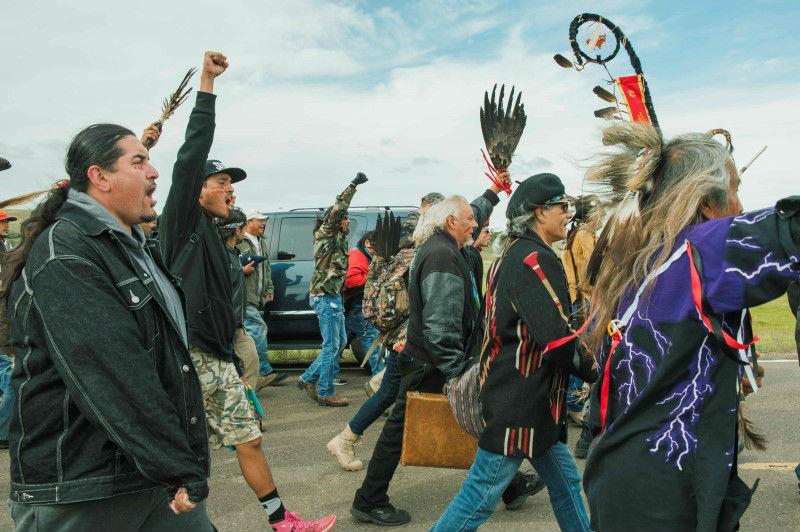US government blocks construction of Dakota Access pipeline bordering tribal reservation
The US government's decision came despite a court ruling against the campaigners

Your support helps us to tell the story
From reproductive rights to climate change to Big Tech, The Independent is on the ground when the story is developing. Whether it's investigating the financials of Elon Musk's pro-Trump PAC or producing our latest documentary, 'The A Word', which shines a light on the American women fighting for reproductive rights, we know how important it is to parse out the facts from the messaging.
At such a critical moment in US history, we need reporters on the ground. Your donation allows us to keep sending journalists to speak to both sides of the story.
The Independent is trusted by Americans across the entire political spectrum. And unlike many other quality news outlets, we choose not to lock Americans out of our reporting and analysis with paywalls. We believe quality journalism should be available to everyone, paid for by those who can afford it.
Your support makes all the difference.Native American campaigners appeared to have scored a major victory after the US government said it would not grant permission for a controversial oil pipeline to be built near tribal land.
A judge on Friday had denied the Standing Rock Sioux tribe’s attempt to halt the construction of the Dakota Access oil pipeline near its North Dakota reservation. However, three federal agencies asked the pipeline company to “voluntarily pause” work on a section that tribal officials say holds sacred sites and artifacts.
The Standing Rock Sioux tribe, whose cause drew thousands to a protest site in North Dakota, had challenged the Army Corps of Engineers’ decision to grant permits at more than 200 water crossings for Dallas-based Energy Transfer Partners’ $3.8bn pipeline, saying that the project violated several federal laws, including the National Historic Preservation Act, and will harm water supplies. The tribe also says ancient sacred sites have been disturbed during construction.

But a joint statement from the Departments of Justice, Army and Interior said it would “reconsider any of its previous decisions” on land that borders or is under Lake Oahe and requested that Energy Transfer Partners halt work within 20 miles east or west of the lake.
The statement also said that the case “highlighted the need for a serious discussion on whether there should be nationwide reform with respect to considering tribes' views on these types of infrastructure projects”.
“The Army will not authorise constructing the Dakota Access pipeline on Corps land bordering or under Lake Oahe until it can determine whether it will need to reconsider any of its previous decisions regarding the Lake Oahe site under the National Environmental Policy Act (NEPA) or other federal laws,” said a statement from the Department of Justice.
“Therefore, construction of the pipeline on Army Corps land bordering or under Lake Oahe will not go forward at this time. The Army will move expeditiously to make this determination, as everyone involved - including the pipeline company and its workers - deserves a clear and timely resolution. In the interim, we request that the pipeline company voluntarily pause all construction activity within 20 miles east or west of Lake Oahe.”
The Standing Rock Sioux, whose tribal lands are a half-mile south of the proposed route, say the pipeline would desecrate sacred burial and prayer sites, and could leak oil into the Missouri and Cannon Ball rivers, on which the tribe relies for water. Last weekend, protests at the site turned violent.
Dakota Access and its parent company, Energy Transfer Partners LP of Dallas, declined to comment.
Reuters said the pipeline would be the first to allow movement of crude oil from the Bakken shale, a vast oil formation in North Dakota, Montana and parts of Canada.
It would carry oil from just north of land owned by the Standing Rock Sioux tribe to Illinois, where it would connect with an existing pipeline and route crude directly to refineries in the US Gulf Coast.
“In recent days, we have seen thousands of demonstrators come together peacefully, with support from scores of sovereign tribal governments, to exercise their First Amendment rights and to voice heartfelt concerns about the environment and historic, sacred sites,” the DOJ statement added.
“It is now incumbent on all of us to develop a path forward that serves the broadest public interest.”
Join our commenting forum
Join thought-provoking conversations, follow other Independent readers and see their replies
Comments